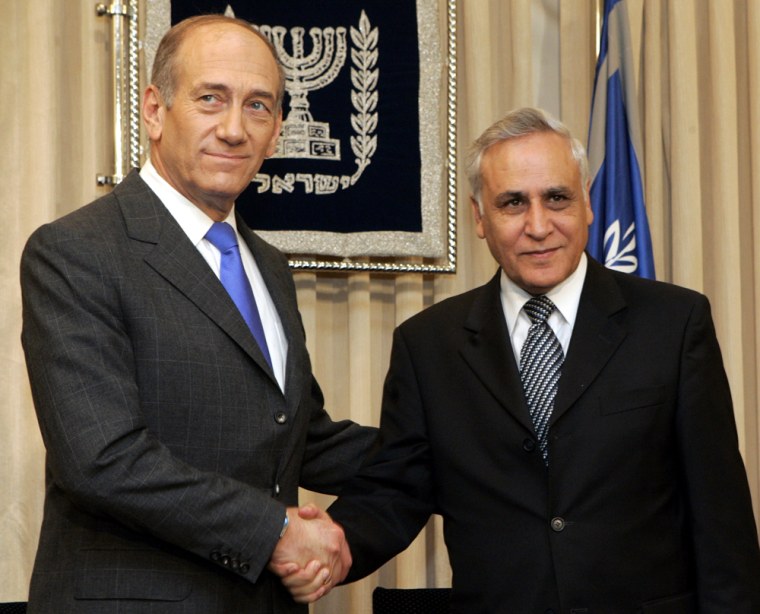The president is being questioned on sexual harassment and wiretapping charges. The former justice minister is standing trial on accusations of sexual misconduct. The prime minister is being investigated for possible foul play in real estate deals.
An unrelenting wave of corruption scandals — which many blame on an increasingly selfish political culture — has further disillusioned Israelis already furious with their leaders over the devastating war in Lebanon.
“It’s too much,” former lawmaker Yossi Sarid said, adding that he feared Israel was “becoming a sort of Sodom.”
The scandals have gotten so bad that President Moshe Katsav chose to remove himself from office for several hours Thursday rather than preside over — and distract attention from — the swearing-in of the new Supreme Court chief justice, one of Katsav’s few responsibilities as the ceremonial head of state.
Israel has never been a paragon of clean government, and a succession of ministers have been embroiled in scandals over the years, including former Prime Minister Ariel Sharon, who was investigated for campaign finance irregularities and other allegations, though he was never charged.
But rarely have so many scandals hit so many top officials at the same time.
Few punished in the past
Sarid, who served as a minister in several governments, said the problem was growing because so few people were punished for corruption in the past.
“People in the leadership started to believe that they can get away without paying the price, and they believed that one way or another they will succeed by surviving,” he said.
The roots of the problem lay in Israel’s shaky transformation from a socialist society focused on the collective good, to a capitalist nation where people only look out for themselves, said novelist Etgar Keret.
Past prime ministers, such as Menachem Begin and Shimon Peres, lived in humble homes and were willing to sacrifice their own interests for those of the nation, Keret said. Current politicians just look out for themselves, he said, pointing to the president’s refusal to step down while he is being investigated.
“The way that Katsav is behaving is not as somebody who is asking what is good for Israel, but as someone who is trying to protect the very good job he has,” he said.
Police are investigating a complaint filed by a former Katsav employee who says he forced her to have sex with him under threat of dismissal. Media reports said six other women have come forward with similar accusations.
Police questioned Katsav for the fifth time Wednesday, broadening their questioning to include allegations that he was involved in fraud, wiretapping and breaching the public trust, said police spokesman Micky Rosenfeld.
Katsav, who had been viewed as a benign, grandfatherly figure, has denied the accusations.
Haim Ramon was forced to step down as justice minister last month when he was charged with sexual misconduct after a female soldier accused him of forcibly kissing her. Ramon initially denied the incident ever happened, but at his trial this week he admitted to engaging in a brief, consensual kiss.
Olmert purchase under investigation
The state comptroller’s office, a government watchdog, is investigating Prime Minister Ehud Olmert’s purchase of a home in Jerusalem, allegedly for far below its market value, and media reports this week said Olmert sold another home a decade ago to a Jewish-American businessman for well above market value.
And the list continues. Police questioned Likud lawmaker Israel Katz on Tuesday on accusations he made improper appointments as agriculture minister. The attorney general told Tzachi Hanegbi, a prominent lawmaker from Olmert’s Kadima Party, that he was going to be charged with fraud, bribery and perjury. Army chief Lt. Gen. Dan Halutz has come under heavy criticism for selling his stock portfolio the day the fighting in Lebanon began.
Even the two chief rabbis are under a cloud. One faces possible charges over accepting favors, and the wife and son of the other are involved in a sordid kidnapping and beating case.
Activists say Olmert’s refusal to appoint a powerful, independent committee to investigate the handling of the war was another sign of politicians’ inability to take responsibility for their actions.
'Every move' scrutinized
Television commentator Motti Kirshenbaum said politicians were not more corrupt — authorities were just better at catching them.
“There is more oversight. There is more criticism. There is more checking on every move that you make,” he said.
And with many of the scandals focused on sexual misconduct, some believed they actually showed an evolution in Israeli thinking, with politicians finally held accountable for inappropriate behavior that had long been winked at.
“What was considered before almost normal behavior all of a sudden is something that can send you to jail,” Kirshenbaum said.
Worse than the scandals, though, is the public’s general indifference to the corruption, a malaise that threatens the country’s democracy, Sarid said.
“People have become more and more passive and more and more apathetic,” said Eliad Shraga, head of the Movement for Quality Government. “They do care. They are serious, but when you do see so many leaders involved in such affairs, at the end of the day you become apathetic.”
